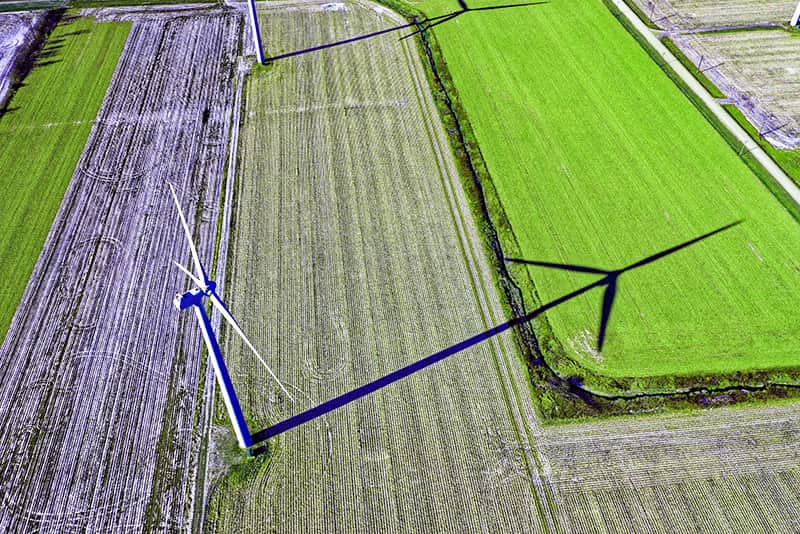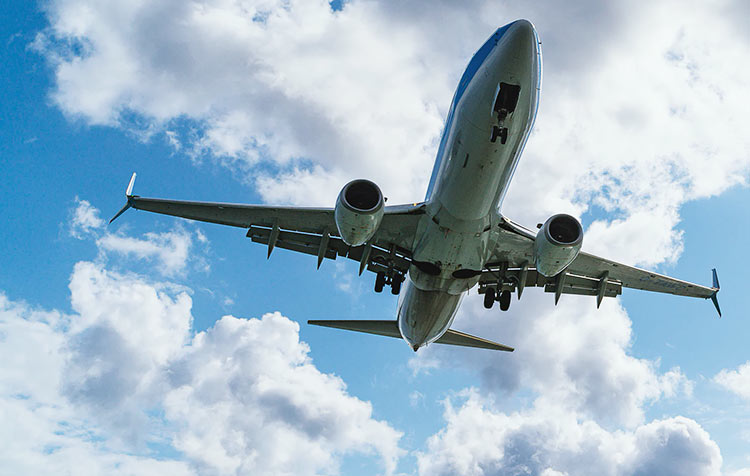What is actually a voluntary CO2-balance and how does it all work in practice? No matter how hard you try, it's not always possible to avoid emitting greenhouse gases - whether it's traveling by air for a well-deserved vacation or traveling from Hamburg to Munich for a seminar. But nowadays there is the option of offsetting one's own emissions by supporting targeted climate protection projects through a donation equivalent to one's own emissions.
But does it really counteract the environmental problem of global warming? Here I would like to tell you everything you need to know about CO2-We'll explain how you can offset your emissions and show you where you can safely go to offset your emissions.
Here is another short Table of contents for you:
Tip: Flight shame is a big topic today! If a flight is absolutely unavoidable, in addition to CO2-By the way, you still have to learn how to compensate, flying more sustainably. I deliberately say sustainableER, because nowadays a flight is basically not sustainable. But there are some tips you can use to reduce the environmental impact of your flight.
What is (voluntary) CO2 compensation?
Anyone who wants to offset their activities that cause greenhouse gas emissions can invest the converted equivalent value in climate protection measures that lead to greenhouse gas emissions being reduced elsewhere. This describes CO2 offsetting.
Why should you do that? Every person has their own CO₂ footprint through their daily actions, which plays a certain part in the environmental problem of the global warming has - according to the Federal Environment Agency, each German emits an average of about 11 tons of CO₂ per person each year.₁ However, science has calculated that each person on this earth is entitled to a climate-friendly emission of only about 2.3 tons of CO₂ per year on average.₂ That is the personal Climate Budget. So with our western lifestyle we are living on credit - the lender is the environment.
To what extent can emissions be offset?
Basically, you can't blame anyone. Many people simply don't know that their own actions have a global impact and contribute to the environmental problems of our time. Nevertheless, the effects of one's own CO₂ emissions can at least be offset. Here are some examples of activities you can offset:
- Air travel: Due to general flight shame, most people compensate for air travel. Important details are, for example, the departure and arrival airports, whether it is a return flight and whether one flies economy or business class.
- Car trips: The equivalent value is calculated on the basis of the distance traveled, the type of fuel and the fuel consumption of the car used.
- Cruises: A cruise is definitely not one of the sustainable ways to travel. The equivalent value of offsetting the emissions is ultimately determined, for example, by the size of the ship, the duration of the voyage and the type of cabin.
- Events: Yes, organizers of festivals and other events can also make a CO₂ offset. For example, the number of visitors, the duration of the event or the size of the area with air-conditioning systems are decisive factors.
- Budget: The energy consumption and the type of heat generation in the dwelling play the most important role.
- Total CO₂ footprint: To calculate the equivalent value, it is crucial, for example, how much meat you consume, how often you get on a plane or how often you buy new clothes.
Notice: Many people are questioning their own lifestyles and, for example, are basically giving up driving. In the article about the car free life you can learn more about it. But if you absolutely can not do without your car, feel free to check out my post with the Tips for sustainable driving.
What costs should I expect?
First of all, let me say: for me, CO₂ compensation represents not a cost but an investment represent. I am the polluter of costs that our environment has to bear. If I cannot or will not prevent CO₂ emissions, then offsetting these costs with money from my own pocket is therefore an investment in a more climate-friendly future.
To give you a rough idea of the amount of your compensation, I've included some Examples compiled for you, which I entered in recommended providers for CO₂ compensation :
- 43 euros (approx. 1.8 tons of CO₂) for a flight from Hamburg to Dubai (economy, scheduled, Airbus A319)
- 103 Euro (about 4.0 tons of CO₂) for 180 car trips per year to work from Berlin to Potsdam. (gasoline engine, 7 liters of consumption per 100 kilometers).
- 112 Euro (about 4.3 tons of CO₂) for a cruise in the Gulf of Mexico. (11 days, ship size 500 - 1000 people, one person, standard cabin).
Tips - How to compensate CO2 correctly

CO₂ offsetting is not just CO₂ offsetting. To ensure that your money ends up at the right place, where the most effective climate protection measures are taken, I would like to give you the following advice.
Tip: Feel free to also take a look at my post about Climate protection tips in everyday lifewhich can be implemented quite easily.
Observe the quality standards
To make sure your compensation dollars end up where they need to be, look for the seals of approval. For example, I look to see that the provider of my choice labels its offerings with the CDM Gold Standard (Clean Development Mechanism) certification. The seal of approval is the strictest existing standard for climate protection projects.
Use an independent CO2 calculator
Of course, every supplier has its own CO₂ calculator. Nevertheless, an independent calculator will help you to balance not too much and not too little CO₂. At Calculator from the Federal Environment Agency you can, for example, store your own CO₂ profile with the number of people in your household or annual air travel and constantly adjust it. This way, you automatically know where there is still potential for improvement and can also assess your personal, climate-friendly development.
Which providers for CO2 offsetting are recommended?
As a rule, trustworthy providers use certificates of a quality standard, such as the CDM Gold Standard. This gives you the certainty that you are at the right address with your CO₂ compensation. Here are the two providers of my choice:
- atmosfair: atmosfair gGmbH is a non-profit climate protection organization based in Berlin. The calculator on the website works fairly and flawlessly. About 90 percent of the in-house climate protection projects are certified with the CDM Gold Standard. You can find out more at atmosfair.com.
- myclimate: The project is a non-profit foundation from Zurich. On the website, you can offset flights, car trips, cruises or your entire CO₂ footprint at a glance. You can find out more at myclimate.org.
If you like, you can decide for yourself which projects you want to invest your money in. For example, support the installation of solar thermal heating systems in South Africa or the construction of a small hydropower plant in Honduras.
Are there companies that automatically offset the CO2 emissions of their guests and customers?
In fact, some companies are forging ahead to offset carbon emissions on behalf of their customers. Here are two examples:
- Unplanned: At this travel startup, you get a customized, unique trip without knowing in advance where it's going. The people in charge want to make travel as sustainable as possible and therefore offset the entire CO₂ emissions of the trips they offer.
- Easyjet: EasyJet is the first airline to offer CO₂ compensation for its own flights. However, scientists criticize the fact that flying emits not only the greenhouse gas CO₂ but also water vapor and nitrogen oxides, which are equally harmful to the climate and should be offset.₃
There is always a risk with such advances that a company will make marketing-effective Greenwashing operates. In order to make a final assessment, you should therefore look very carefully before the environmental commitment of a company finally convinces you to buy a service or a product.
Does CO2 compensation make sense or is it modern indulgence trading?

Avoiding greenhouse gas emissions should, of course, always take priority over offsetting them. Also because the CO2-In a certain way, compensation inhibits the social debate that we actually need. Because people pay their compensation contribution, they are basically given the impression that the problem has been solved. But that's not the case, of course. Nevertheless, every CO2-emission better than any non-compensated one.
One question remains, however: Why don't we always compensate? In other words, automatically for flights, car journeys and products in the supermarket? Then many people would prefer to make climate-friendly decisions...
What do you think about the CO2-compensation and which activities have you already compensated? I look forward to your comment.
Stay clean,

PS.: In the Mobility Blog you will get many more tips! Learn, for example, how you can, if you can not do without a flight, nevertheless as possible plastic free fliegen simply by following your heart.
References:
₁ Umweltbundesamt: Voluntary CO2 compensation (as at: 23.07.2019), available at https://www.umweltbundesamt.de/themen/freiwillige-co2-kompensation. [24.03.2020].
₂ atmosfair gGmbH: Air travel and the personal climate budget, available at https://www.atmosfair.de/de/gruenreisen/persoenliches_klimabudget. [24.03.2020].
₃ M. Zimmer; MDR: Easyjet to fly carbon neutral with immediate effect (as of Nov. 24, 2019), available at https://www.mdr.de/nachrichten/wirtschaft/inland/easyjet-will-klimaneutral-fliegen-100.html. [24.03.2020].





